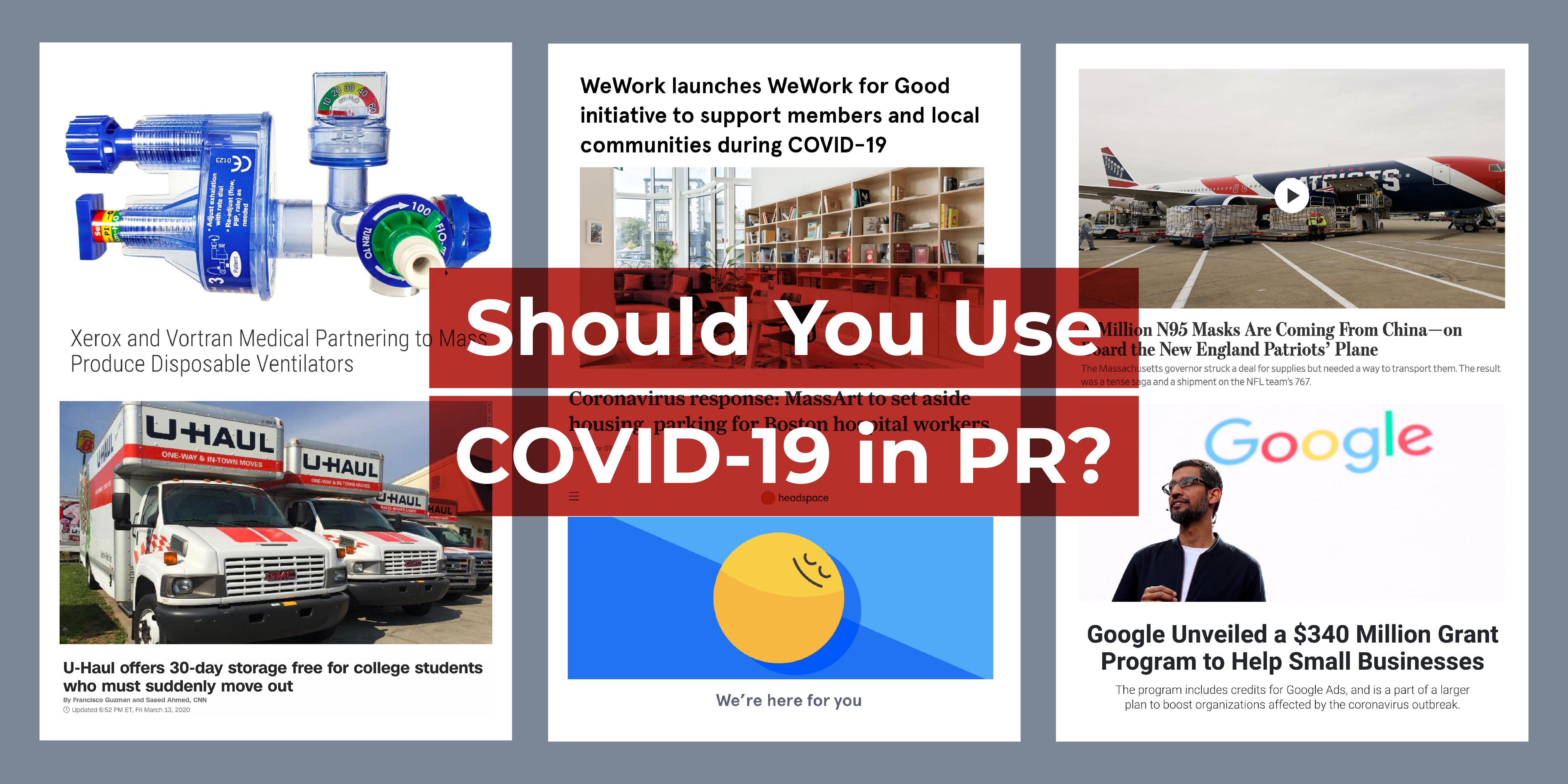Should You Use COVID-19 in PR?
Apr 10, 2020 Beth Monaghan
Is it appropriate to use COVID-19 in PR efforts? And if so, how do you strike the right tone? If you were in this field after 9/11, you may remember a PR person getting blasted in a major daily newspaper for a pitch that went something like, “While 9/11 was a tragedy, another that’s overlooked is student loan debt.” It was the wrong tone at the wrong time. Thoughtfulness regarding COVID-19 is the right instinct.
The question of mentioning COVID-19 in PR is easier to answer when the initiative is purely altruistic. I am overwhelmed by the outpouring of clients who are helping in meaningful ways. Xerox is partnering with Vortran to manufacture disposable ventilators. It’s also working with Hickey Freeman to turn printer filters and common textiles into medical-grade masks. And the Massachusetts College of Art and Design is offering its dorms and parking facilities as temporary housing for Boston’s medical workers. I could go on and on, thank goodness. (See Forbes’ list of 50 ways companies are giving back.)
It’s more complicated to get the tone right when the PR initiative involves a product or service. And yet, this is a time when organizations face the very real economic issue of how to continue business operations during a pandemic. They need to sell to retain their teams. Is it wrong to offer a service for free, which may, at some point engender the kind of goodwill and awareness that turns into revenue?
This is the question that thoughtful marketers are asking themselves, and it’s the question I answer most frequently these days. No one wants to take advantage of the situation. But everyone needs to find ways for business to carry on. In fact, we all do for the sake of the economy. My advice: if you go in with the intent to help, you can rarely go wrong. Let’s look at some examples.
As part of its $800 million in relief funds, Google is providing $340 million in ad credits to help small- and mid-sized businesses attract customers. Google is doing it “to alleviate some of the cost of staying in touch with their customers." This will also help create long-term relationships that will help Google retain and maybe even grow its own customers down the road. This feels like a perfect way to help.
Headspace, a meditation app, which offers a free trial for anyone who signs up, has expanded it with a “Weathering the Storm” package. I imagine this is spurring a slew of sign-ups, especially as we see hashtags like #selfcare trending on social media. I am cheering for them. If everyone meditated, the world would be a better place. They are helping by offering their product.
WeWork launched WeWork for Good to provide office space to “to organizations and member companies on the front lines of the COVID-19 response and relief efforts.” It sounds like this space is needed, and WeWork also needs some good press given the financial fallout from the fall. It’s good for those organizations and it’s good for WeWork.
U-Haul is offering 30 days of free storage to college students who are displaced due to the coronavirus outbreak. It’s incredibly generous, and also an amazing strategy to bring those customers back when they return to school and need moving services.
Here at InkHouse, we created a COVID-19 crisis communications plan template and have made it available for free on our website. This is something we’d normally charge for, but given the massive scale of this crisis, we wanted to help. And I also hope it will help build some goodwill that will bring clients to us when the economy comes back.
These are examples where doing the right thing is also the right thing for business. And that’s how a symbiotic economy is going to work. So do good deeds, offer services to audiences who need them, and sell your offerings to the people who need them and can afford them now. Just begin with “how can we help?” It is the seed from which all successful outcomes, in PR, and in life, grow.

.png)




